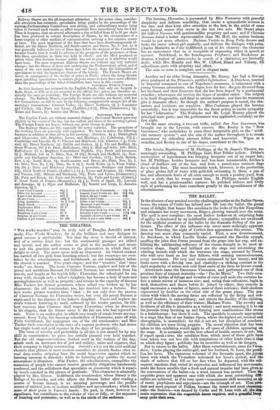THE THEATRES.
" WIT works wonders" may be truly said of Douglas Jerrold's new co- medy, Time Works Wonders; for to the brilliant and racy dialogue its great success is attributable. Not that the story is devoid of interest, and of a serious kind too; but the sentimental passages are stilted and unreal, and the author seems as glad as the audience and actors to quit the gravities and return to the pleasantries in which they all delight to revel. The piece opens with an elopement. An Oxford student has carried off two girls from boarding-school; but the runaways are over- taken by the schoolmistress, and Goldthumb, an old trunkmaker, before the church is reached. Five years elapse; and the " wonders " that " time works" are shown. The lover, Clarence Norman, nephew and heir of the proud and ambitions Baronet Sir Gilbert Norman, has returned from his travels, and laughs at his boyish folly: Florentine, the school-girl he ran away with, though only a baker's daughter, has become a lady of taste and accomplishments as well as property; and retains in-the capacity of duenna Miss Tucker, her former governess, whose school was broken up by her elopement: the old trunkmaker, too, has tumbled into a fortune. But love works greater wonders than " time"; for not only does the passion of Clarence Norman for Florentine revive, but even the proud Baronet is captivated by the charms of the baker's daughter. Uncle and nephew are rivals without knowing it; until, softened by the tender passion, Sir Gil- ' bert consents that Clarence shall marry Florentine; when he discovers, to his chagrin, that his future niece is the fair one who had rejected his suit. There is an under-plot, in which two couple of comic lovers are con- cerned: Bessy Tulip, the runaway schoolfellow of Florentine, pairs off with Felix Goldthumb, the scapegrace son of the old trunkmaker; and Miss Tucker finds consolation in the vows of a vagrant professor, who had stolen her virgin heart and gold repeater in the days of her prosperity.
The want of novelty and probability in all this is not atoned for by any alcill in construction: no piece less artfully planned ever held together. But the old stage-conventions, clothed anew in the fashion of the day, Admit such an incessant fire of jest and raillery, satire and repartee, that their company is highly entertaining. Jerrold's wit is not the cold artificial rhetoric that glitters in most modern comedies: its electric flashes often re- veal deep truths, stripping bare the social hypocrisies against which its burning sarcasm Is directed; while its lightning play purifies the moral atmosphere it illumines. Miss Tucker, the schoolmistress, exemplifies the meanness of people who cannot receive gracefully obligations handsomely conferred, and the selfishness that speculates on generosity which it repays by insult couched in the phrase of gratitude. This character is admirably -played by Mrs. Glover. Goldthumb, the trunkmaker, whose library is the linings of his trunks, and who affects the Roman father after reading a course of Roman history, is an amusing personage, and the prolific Source of satirical jests on modern scribblers and speechmakers; which lost Pone of their point in Farren's hands. No part, in short, however in- saigniftant, but contributes to the rebuke of vice or folly, or the exposure of liumbig and pretension, as well as to the mirth. of the lanBentifiu
The heroine, Florentine, is personated by Aliss Fortescue With grane.114 simplicity and delicate sensibility, that 'excite a sympathetic interest in her fate, and thus keep alive attention to the last, in the midst of some most farcical scenes that occur in the last two acts. Mr. Stuart plays Sir Gilbert Norman with gentienitialilse propriety and ease; and if Clarence Norman found a better representative than Mr. Holl, the serious businets would be yet more effective. Madame Vestris as Bessy Tulip dresses and looks the saucy school-girl capitally, and delivers the dialogue with poinj. Charles Mathews, as Felix Goldthumb, is out of his element: the character has an earnestness that he is incapable of expressing either in speech or manner. Strickland, as the humbugeous Professor, and Bnekstone as Bantam, a trainer of game-cocks, in search of a character, are farcically droll; while Mrs. Humby and Mrs. W. Clifford, Bland and Tilbury, fill subordinate parts with propriety and effect.
The miss en scene is complete, and in elegant taste.


























 Previous page
Previous page